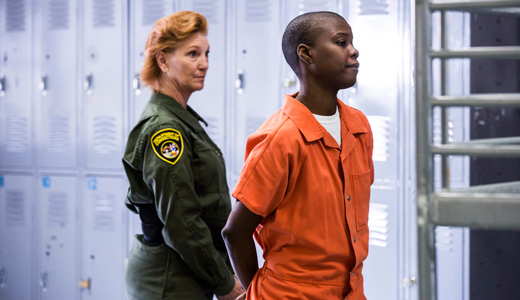
It is no secret that the United States has a mass incarceration problem. While the U.S. represents 4.4 percent of the world’s population, it houses 22 percent of the world’s prisoners. In 2014 a Rutgers University study reported that more than 2.7 million, or 1 in 28, children in the U.S. have an incarcerated parent. Of these kids, Black children are the most affected, as 11.4% (1 in 9) have a parent in prison, in comparison to white children at 1.8% (1 in 57). Further, a Central Connecticut State University study published in 2015 found that children with incarcerated parents are three times more likely than those without incarcerated parents to be arrested, convicted, or incarcerated in the justice system themselves.
These facts and figures translate into the U.S. not only having a mass incarceration problem, but a crisis of Black and Brown people finding themselves caught up in the vicious cycle that is the criminal justice system from youth to old age at an alarming rate. Yet, even with these facts and studies available to the public, the message that far too many people of color are held captive in prison can fall on deaf ears.
Yet, now there exists a way for audiences to experience this crisis first hand. Project Empathy, a virtual reality (VR) film series, explores the U.S. prison system. Through three virtual reality films by award-winning directors, the project invites audiences to walk in someone else’s shoes, in order to better understand mass incarceration in America.
Virtual Reality (VR) film and content is quickly gaining traction in the entertainment industry, as companies such as Oculus, Sony, HTC, Samsung, and Google are creating total immersion experiences in 360 degrees that viewers can have right in the comfort of their own homes. VR is an immersive experience in which your head movements, through the use of a VR headset, are tracked in a three-dimensional world. While this technology has mainly been used for video games so far, filmmakers, such as those working with Project Empathy, are using it as a means to immerse audiences in the Black and imprisoned experience.
Left Behind, the second piece in the series, is a scripted short film shown through the eyes of a 9-year-old Black girl. You watch, and experience, what begins as a normal day in the park quickly unravel into tragedy as the girl’s mother is arrested and taken to prison. The audience experiences the heartbreaking prison visit between mother and daughter, along with the loneliness the girl feels in the group foster home she must now live in since her mother is incarcerated. The film premiered on Sept. 15th at The Atlantic’s Race+Justice Summit in Los Angeles. After the premiere, Jamie Wong, Creative Director and Executive Producer of Project Empathy, and the film’s director, Wendy Calhoun, took to the stage to talk about the project.
Calhoun, who is currently the Co-Executive producer for the hit television series Empire, also wrote the script for Left Behind. “We don’t hear enough of these stories that give voice to women and mothers,” Calhoun explained at the premier. Although the film is fictional it was explained by Calhoun and Wong that it is a composite of dozens of interviews conducted during the film’s research process that included inmates, their children, prison staff, and police officers. “This [crisis] is happening to children all over the nation but no dialogue is being given to it,” the director explained.
Wong, who also wrote and directed the first project in the Project Empathy series “The Letter”, explained why there is a need for more narratives from women of color. “It is intuitive to tell stories from women of color because I am a woman of color. Women need opportunities to do work like this. Project Empathy’s core aim is to break down the divide between “us” and “them.”
Susan Burton, Founder and Executive Director of A New Way of Life– a re-entry project that seeks to advance multi-dimensional solutions to the effects of incarceration- also spoke at the premiere. “Black children are disproportionately impacted,” Burton explained. “[There are] really traumatic layers of all this on women. What do we do instead of all this damage [of mass incarceration]? The history of this country is built upon tearing apart African-American women from their children since slavery. Eight in 10 women in jail are mothers. Generations of mothers and daughters are incarcerated in the same institution,” the executive director stated.
Connecting the existence of the film to the continued struggle against police brutality, a struggle being led by Black Lives Matter, Calhoun expressed, “The movement [Black Lives Matter] has gotten me fired up. Through new technologies we can now get the message to people directly. The movement gives me the fuel. It helps craft the stories I want to tell.”
On the road forward with VR and social impact Wong said, “We know we are building a model that can be effective across all types of social issue.” Burton added, “Training, legal support, patience, and a range of things to heal from the trauma of mass incarceration is needed. We need to strengthen the ‘nation of mothers.’ We need to end this crisis of mass incarceration and heal as a country.”
Photo: Screen shot from the film that can be found on projectempathyvr.com.

MOST POPULAR TODAY

High Court essentially bans demonstrations, freedom of assembly in Deep South

U.S. imperialism’s ‘ironclad’ support for Israel increases fascist danger at home

Zionist organizations leading campaign to stop ceasefire resolutions in D.C. area

Resource wars rage in eastern Congo, but U.S. capitalism only sees investment opportunity

UN warns that Israel is still blocking humanitarian aid to Gaza



Comments